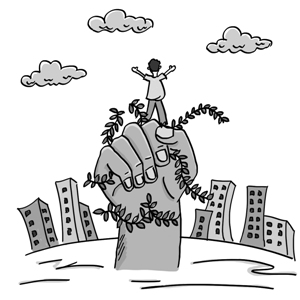
Shanghai officially entered summer on May 11 as meteorologists announced that up to Wednesday, the average temperature reached 22 C for five consecutive days - the recognized criterion for the start of summer.
Summer in the city means watermelons, bikinis and annoying mosquitoes. This week also witnessed the "nail-down" for local would-be Grade 1 and Grade 6 students. Expatriates are probably becoming gradually more familiar with China's somewhat singular school enrollment system, as previous columns in this paper have explained.
On Wednesday, residents in Songjiang district received the good news that a battery company has canceled its plans for a plant, and chosen to withdraw from the district altogether.
The Shanghai Guoxuan High-Tech Power Energy Company made an announcement on a Songjiang district television station that, due to the forthright views of local residents, it had canceled its Shanghai project and returned the land it had acquired to the local government without demanding compensation.
The controversial battery company came to public attention when Songjiang residents began small-scale protests in early April such as sporting slogans on their cars like "Love Songjiang and reject pollution." Citizens drove their cars around Songjiang district government buildings and posted photos on the Internet to protest against the plant. With lead poisoning cases being reported nationwide, the public today is far more informed about the hazardous dangers of such chemical facilities.
On April 26, Songjiang district government announced that no chemical processes would take place at Guoxuan in Shanghai, although other projects and the assembly lines would remain.
Residents, however, were not satisfied with this compromise, and continued to petition people living nearby to protest against the plant on weekends in May.
Some have called the dramatic backdown a "victory" for local residents.
I don't live in Songjiang district, but I would like to say that I feel lucky to be a resident of Shanghai where the government acts responsibly and is concerned for the welfare of the general population. This is especially admirable given that economic development often trumps all other concerns in today's society.
But the country's economy is slowing down, and it's becoming harder for the government at all levels to attract investment to boost local GDP, taxation and employment opportunities.
It's easy to imagine how excited officials must have been when this deal with Guoxuan, an Anhui Province-based company, was first agreed.
An environmental evaluation was conducted by a third-party institute and published on the local environment authority's website last September.
But residents doubted the credibility of the report and its claim that the plant wouldn't cause much pollution.
It was obviously a tough decision for both the company and the government to choose not to go ahead with the project. And the Shanghai government set a good example to its counterparts in other parts of China.
A city's development should never advance at the cost of the environment and people's health.
The ultimate aim of economic development is to guarantee a better life for citizens. And when conflicts occur, this is when the wisdom and insight of a government are really tested. So I think that Shanghai residents have reason to appreciate the government's open-mindedness on this issue.
As far as contentious issues are concerned, it's not uncommon to see physical conflicts, even brutality, between the public and law enforcement staff. But in Shanghai, we rarely see disputes getting out of hand in this way. Protestors are usually rational and law-abiding, and the need for police intervention is thankfully rare. Compared with protests against PX projects in other cities in the past year, Shanghai seems to have achieved an exemplary model of good behavior on both sides.
Here, I would also like to give a thumbs-up to local residents. While Shanghai men are often mocked by people from other provinces as being "timid" or even "cowardly," these are now seen as admirable qualities in that our city's men rarely resort to violence or force. They are able to argue and reason, without the need for fists.
From this incident, it is also vital to reiterate the importance of not seeing the government as the "opposing side." It is far more complex than that.
A harmonious society cannot be achieved without efforts from both sides. It's not always a win/lose situation. In my opinion, it can be a win-win deal if the right decisions are made.
This whole situation has taught officials valuable lessons in knowing how to deal with such incidents in future.
For future similar projects, more thorough scientific investigations will be carried out, and more public opinions will be taken into consideration.
And, if public mass incidents arise, they will be better planned, and handled by the relevant authorities.
The author is the managing editor of Global Times Metro Shanghai. fengyu@globaltimes.com.cn

